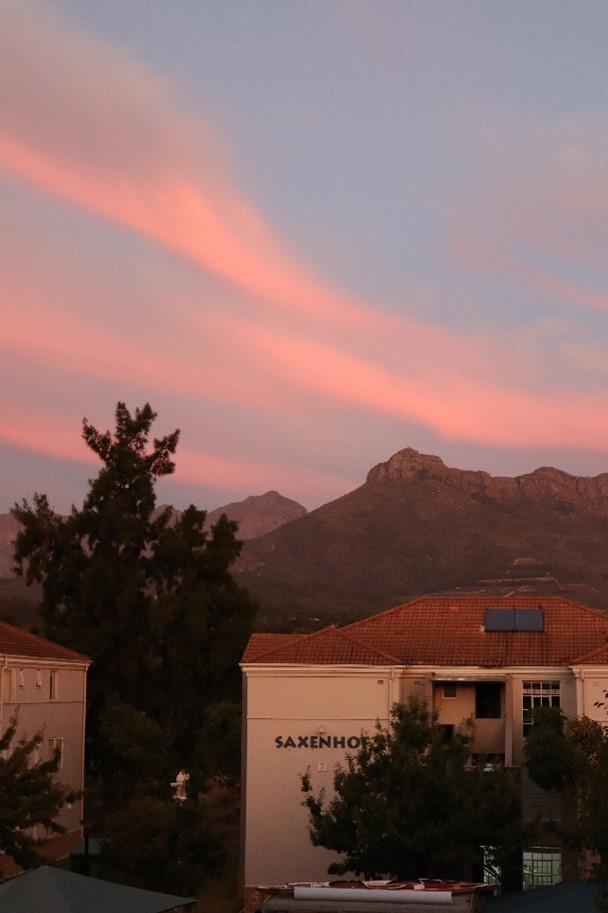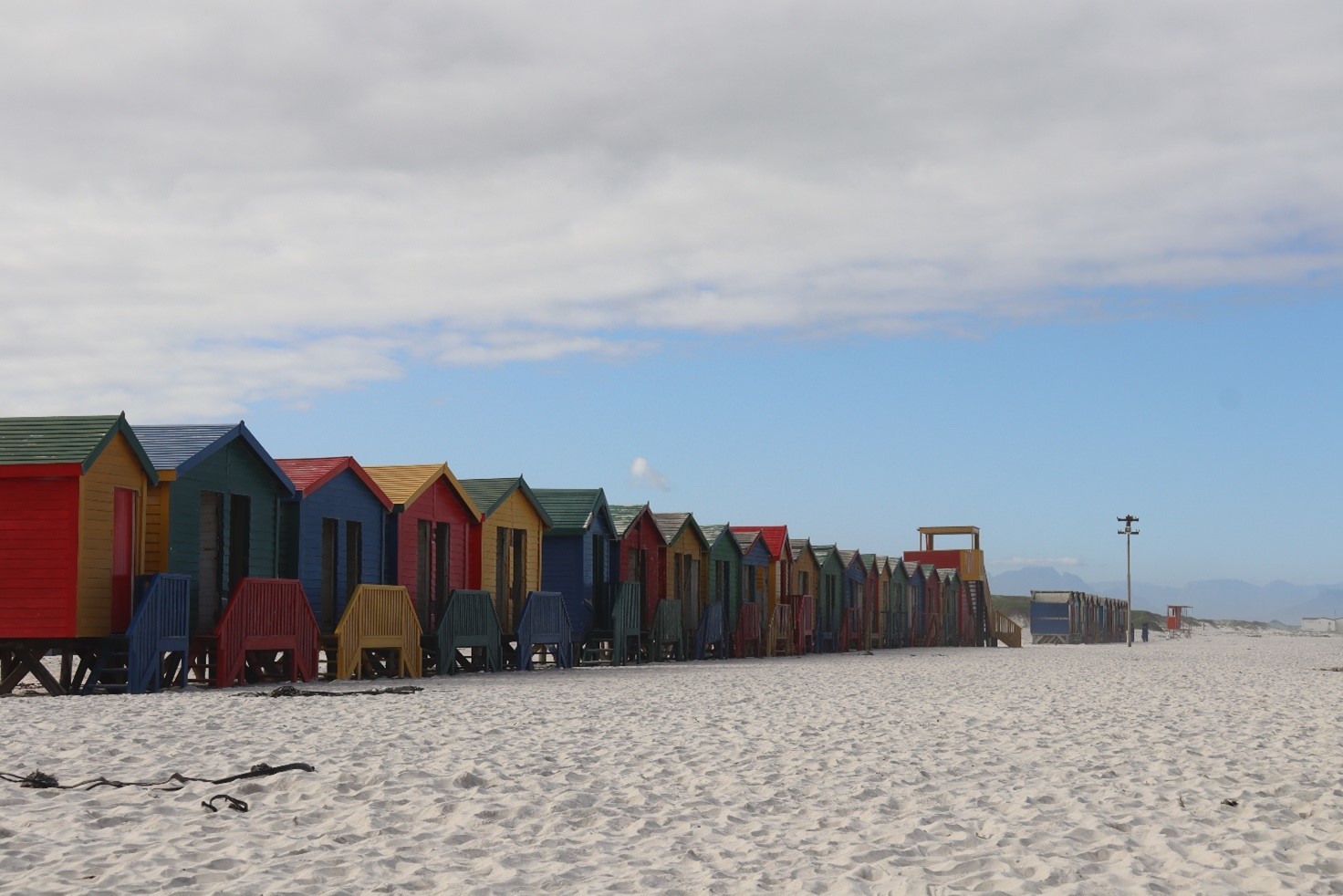Student at the Faculty of Social Sciences
I arrived in the sunny South Africa in early February, after luckily receiving my visa on time a few days prior. If you are planning to study in South Africa, it should be noted that Finnish students must obtain their visas from the South African Embassy in Sweden, and the process will likely take longer than expected. If you can, you should apply well on time. We were very unlucky, and the Embassy in Sweden was closed off for applications all December, so we could not apply for our visas until January. We were all quite stressed, but luckily we had a WhatsApp group for all students from University of Helsinki, so we could share tips on what worked and what did not to make the visa process faster. In the end all but one of us managed to get the visas on time and arrive in South Africa before the orientation.
Our exchange contract included free accommodation in Academia Student Accommodation, and the process of signing in and getting your room were very smooth. The residence had its own international coordinator, a fellow student, who made sure everything was going smoothly for us, and was always happy to answer any questions.

During our semester, Stellenbosch University had more exchange students than ever before. In total there were 600 of us. However, 400 out of those were part of the SKEMA business school that has its own campus in Stellenbosch and did not take the same classes as the rest of us or local students.
It was very easy to get to know other exchange students. The International Office of the University organized weekly trips and activities for us, and that was a good way to get to know others. They also organized “Global Education Programme” (GEP) modules, which were only open to exchange students. I took two GEP modules and got to know a lot of other exchange students through that too. For me, getting to know local students was also quite easy, as I was taking postgraduate modules and the class size in my modules was always less than 30 students. This means everyone was interacting during group projects and class discussions, and it was easy to get to know them. My friends who were doing undergraduate classes said it was not as easy, as the classes usually had hundreds of students and no interactive parts.

One big thing that required getting used to was the so called “loadshedding”. This refers to the electricity outbreaks schedules by Eskom, the main energy provider. I downloaded an app, that would help me keep track of loadshedding, and the app was a real lifesaver. You could usually see the loadshedding schedule of the week easily, and it would remind you every time 55 minutes before the next power outage. In the beginning loadshedding was quite easy, we only had maybe 4-6 hours scheduled per day. But the energy situation in the country kept getting worse during the semester, and by the end of it we could easily have 10-12 hours of loadshedding a day. Usually, it would be broken down to 2-4 hour long outages. It required getting used to, but it was not impossible to plan your life around it. Mostly it was annoying because in Academia we had electric stoves instead of gas, so we could not cook during loadshedding. But even during loadshedding there were a lot of generators at the University and at the malls and restaurants, so they still had electricity. Our residence did not have generators though, so my headlamp and powerbanks were used a lot during the exchange. Also, in most parts of the town street lights did not work during loadshedding, so it was a bit scary walking home at night.
This was not my first time in South Africa, and I have travelled around the continent quite a lot. I think because of this I had quite realistic expectations for my exchange. The hardest parts are probably getting used to the safety situation and the constant inequality you witness. We got a safety briefing from the University, and while Stellenbosch really seems like a super safe city, it still is important to be very aware of your surroundings. I would never recommend walking alone at night, but luckily Ubers are safe and very affordable. Around the campus area we could also always send a WhatsApp message to Campus Security, and they would send someone to walk you home during dark. I did not have any dangerous situations, and I did not have anything stolen, but I did hear of other exchange students who got mugged because they were walking home at night during loadshedding. Still, I felt quite safe in Stellenbosch and in Cape Town, but I kept myself aware of my surroundings always.
For me the hardest part was seeing all the racism and inequality. If you don’t know about the history of Apartheid, I would highly encourage you to read about it. Especially if you are planning on going to South Africa. Officially racism is legally prohibited, but you can still tell that white people are very privileged in many ways, and especially the black South Africans face struggles every day that others don’t. Last time I went to South Africa was in 2018, and it was painful to see that in 5 years the townships had expanded, and there were a lot more homeless people in the streets of Cape Town than before. Personally, for me it is very draining to see so much inequality and suffering, and not be able to do anything about it. So, I would mentally prepare for seeing all that in South Africa, as the longer you are there, the more you notice how unfair the system really is.

However, all in all my exchange semester in Stellenbosch was very lovely. It was very hard to say goodbye to new friends and to the country. I fully believe South Africa has one of the most beautiful natures in the entire world. Luckily it is also easy to travel around either with other exchange students or tour companies. I was also very happy with the modules I took, and I believe I learned a lot of things I would have never learned, even if I had studied the same issues back in Finland. I also know I made a lot of friends, who I will keep in touch with hopefully until we are all old and wrinkly. It might sound funny, but despite some challenges and annoyance with the bureaucracy with this semester, I would not change anything. I think this will be forever one of those memories I will cherish.
